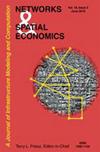政府间转移支付对俄罗斯地区收入的影响
IF 1.5
3区 工程技术
Q3 OPERATIONS RESEARCH & MANAGEMENT SCIENCE
引用次数: 1
摘要
鉴于目前制裁加剧、资源短缺和俄罗斯经济开始进行结构改革的情况,重新评估现有经济政策工具的效率,以便重新调整这些工具的任务变得至关重要。在本出版物中,我们研究了政府间预算转移,特别是补贴对俄罗斯区域经济增长的影响。我们对俄罗斯相关地区的全部样本和三个地区的子样本进行了分析,这些地区的预算对转移支付的依赖程度不同。此外,我们根据自然资源开采在其经济中所占的份额将地区分为两组。我们的分析表明,区域预算中收入转移的份额增加之后,人均国内生产总值增长率也随之增加——然而,这只适用于转移依赖程度中等的地区。这些在采掘业中就业比例高的地区加强了转移的积极作用。增加对地区预算的补贴之后,也会出现更快的增长——但仅在中等至高度依赖外来转移支付的地区;对于低依赖转移的地区,补贴的效果是微不足道的。在我们使用的控制变量中,GRP中资本投资的份额和受过高等教育的就业比例也对应于较高的经济增长率,但同样-仅适用于中等程度依赖收入转移的地区。使用空间Durbin模型,我们控制了区域之间的空间效应。总的来说,我们的分析表明,俄罗斯目前实行的政府间转移支付制度只促进了对转移支付依赖程度中等的地区的增长本文章由计算机程序翻译,如有差异,请以英文原文为准。
Influence of Intergovernmental Transfers on Regional Incomes in Russia
Given the current conditions of intensifying sanctions, scarcity of resources and the start of a structural transformation of the Russian economy, the task of a reassessment of the efficiency of existing tools of economic policy, so that these tools can be realigned, becomes vital. In this publication, we study the influence of intergovernmental budget transfers, subsidies in particular, on regional economic growth in Russia. We perform the analysis on the full sample of relevant Russian regions and on three subsamples of regions, differing in the degrees of regional budgets’ reliance on transfers. Additionally, we divide regions into two groups, based on the shares of natural resources extraction in their economies. Our analysis shows that increases in the shares of incoming transfers in regional budgets are followed by increases in the rates of growth of GRP per capita – however, this works only for regions with a medium degree of transfer reliance. Such regions having high shares of employment in extraction intensifies the positive effect of transfers. Increases in subsidies to regional budgets are also followed by faster growth – but only in regions with a medium to high reliance on incoming transfers; for regions with a low reliance on transfers the effect of subsidies is insignificant. Among the control variables we use, the share of capital investment in GRP and the share of employed with a higher education also correspond to higher rates of economic growth, but again – only for regions with a medium degree of reliance on incoming transfers. Using the spatial Durbin model, we control for spatial effects between regions. Overall, our analysis shows that the system of intergovernmental transfers currently in place in Russia promotes growth only for regions with a medium level of reliance on transfers
求助全文
通过发布文献求助,成功后即可免费获取论文全文。
去求助
来源期刊

Networks & Spatial Economics
社会科学-运筹学与管理科学
CiteScore
4.00
自引率
4.20%
发文量
26
审稿时长
>12 weeks
期刊介绍:
Networks and Spatial Economics (NETS) is devoted to the mathematical and numerical study of economic activities facilitated by human infrastructure, broadly defined to include technologies pertinent to information, telecommunications, the Internet, transportation, energy storage and transmission, and water resources. Because the spatial organization of infrastructure most generally takes the form of networks, the journal encourages submissions that employ a network perspective. However, non-network continuum models are also recognized as an important tradition that has provided great insight into spatial economic phenomena; consequently, the journal welcomes with equal enthusiasm submissions based on continuum models.
The journal welcomes the full spectrum of high quality work in networks and spatial economics including theoretical studies, case studies and algorithmic investigations, as well as manuscripts that combine these aspects. Although not devoted exclusively to theoretical studies, the journal is "theory-friendly". That is, well thought out theoretical analyses of important network and spatial economic problems will be considered without bias even if they do not include case studies or numerical examples.
 求助内容:
求助内容: 应助结果提醒方式:
应助结果提醒方式:


